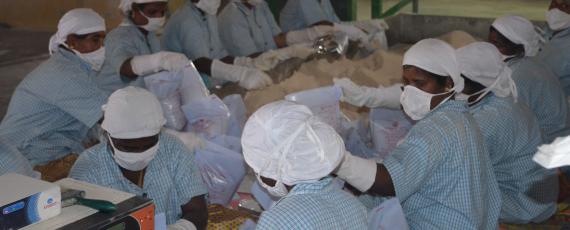Public and private alliances working towards reduction of undernutrition

The Supplementary Nutrition Programme (SNP) under the Integrated Child Development Services (ICDS) in India presents a unique example of a state-led food distribution initiative to address under-nutrition. Targeted at pregnant and lactating women, children (0-6 years) and adolescent girls, the SNP uses an agri-food value chain-based approach to improve nutrition status of these vulnerable groups.
Food distribution through a Supplementary Nutrition Programme (SNP) is a major component of the Integrated Child Development Services (ICDS). The SNP is possibly the largest feeding programme in the world focused on improving nutritional intake of children and women by providing 'spot feeding' and 'take home rations' (THR). A state-led initiative, it offers scope for participation of business through PPP. Different models are found to be in operation in different states of India. The model in operation in the state of Tamil Nadu maybe seen as a successful example of both PPP and public-private and cooperative business partnership. Tamil Nadu spends an additional amount from its own budget over what is mandated under the national programme.
A fortified premix made from chickpea, maize, finger millet, jaggery and wheat is given to pregnant and lactating women and children below 3 years under the programme. Wheat is made available by the state. Under one variant of the model, the private enterprise manufactures the fortified blend and supplies to decentralised women cooperatives who then manufacture the premix with the blend and wheat flour milled by them, package and transport the final product to ICDS centres; about seventy five per cent of the total premix requirements are currently sourced in this manner. The balance requirement of premix is manufactured entirely by a private sector manufacturer and supplied to designated ICDS centres for distribution. The private player is selected through a process of competitive bidding and contracted for a specified period.
The women’s cooperatives have been promoted by the state with members drawn from economically poor households, to engage in productive income generation activities. The tie-up with the private sector for the manufacture of fortified THR enables them to operate at scale while ensuring maintenance of quality standards and get assured returns. From the private sector perspective, the partnership offers an assured market and utilisation of their production capacity; at the same time, they have room to diversify into other products for sale in the open market. The proposition presents a multiple ‘win’ for all the players, while addressing the problem of malnutrition of vulnerable sections of the population.
The quantity to be supplied being fixed and formulation prescribed, the nutrient-dense food is provided under the programme in a safe and sustained manner to women and children from poor households. Undernutrition levels among children and women in Tamil Nadu are better than the national average. The PPP model to deliver nutritious food under a social protection measure presents a viable option for emulation towards addressing the SDG 2 of ending zero hunger.
The blog was originally published on The Practitioner Hub for Inclusive Business








Add new comment